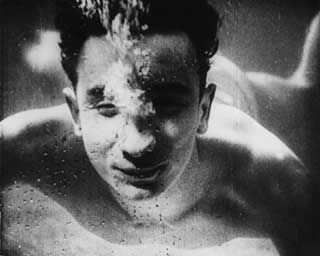5.17.2005
jean vigo, taris
most film footage involving athletes-- whether narrarated by bob costas or directed by kon ichikawa-- tends to focus on ideal forms and circumstances. the athlete is typically an exhalted "everyman," directing his or her physicality towards an unforseen "natural" union. the inhumanity of the performance is, in fact, a superhumanity. the athlete brings to life the imagined blossoming of his/her audience. a person's prime-of-life becomes a cinematic artifact.
in jean vigo's short film taris (1931), which i had the great pleasure of seeing (alongside all three of his other completed films) this weekend at the international house, something of a different character occurs. french swimming champion jean taris, whose bodily feats determine the form and content of the film, is the typical ideal performer one would expect from such a thing. but vigo's glance into his daily routines bears the mark of a more peculiar observer.
we see feet flap and water splash... we watch taris' head in slo-mo, twisting to the right and to the left, his mouth breaking open like the blow-hole of a whale... we see him strike poses on dry land... we watch bubbles shoot out of his nose... and all the while, taris remains the conventional, extraordinary performer. but despite this miraculous display, one begins to get the sense that a human being does not belong underwater. and it's true... water is literally a danger to us. there's no air in there.
still, vigo's film is not an angry inversion of athletic expectations. he has a better time than that. instead, he glorifies the absurdity of being underwater. taris becomes a homely but lovable creature-- a hairless, flapping mammmal making the best of a strange situation. he is not at war with the pool, either. his ordeal is no hemingway-style test-of-strength. the film is, instead, an appreciation of the odd places humans stick themselves-- how they adapt to their chosen situations, how they excel within them, and how they remain radically and wonderfully at odds with them nonetheless.

in jean vigo's short film taris (1931), which i had the great pleasure of seeing (alongside all three of his other completed films) this weekend at the international house, something of a different character occurs. french swimming champion jean taris, whose bodily feats determine the form and content of the film, is the typical ideal performer one would expect from such a thing. but vigo's glance into his daily routines bears the mark of a more peculiar observer.
we see feet flap and water splash... we watch taris' head in slo-mo, twisting to the right and to the left, his mouth breaking open like the blow-hole of a whale... we see him strike poses on dry land... we watch bubbles shoot out of his nose... and all the while, taris remains the conventional, extraordinary performer. but despite this miraculous display, one begins to get the sense that a human being does not belong underwater. and it's true... water is literally a danger to us. there's no air in there.
still, vigo's film is not an angry inversion of athletic expectations. he has a better time than that. instead, he glorifies the absurdity of being underwater. taris becomes a homely but lovable creature-- a hairless, flapping mammmal making the best of a strange situation. he is not at war with the pool, either. his ordeal is no hemingway-style test-of-strength. the film is, instead, an appreciation of the odd places humans stick themselves-- how they adapt to their chosen situations, how they excel within them, and how they remain radically and wonderfully at odds with them nonetheless.

